
eugeniek/iStock/Getty Images
A sprinkle of cheese boosts the flavor of many foods, including tacos, lasagna, potatoes, vegetables and sandwiches. Add cheese to your food to increase your intake of certain nutrients, but be aware of the fat and salt content. Learn more about the nutritional differences between cheddar and Swiss cheese to help you determine which kind has a place in your healthy eating plan.
Fat
Cheese is a significant source of fat, particularly saturated fat. Saturated fat comes from animal foods, such as meat, milk and cheese. You should limit your daily intake of saturated fat to 10 percent or less of your total consumption of calories. A 1-oz. serving of cheddar cheese contains 9.4 g of total fat, with 5.98 g of that being saturated. A 1-oz. serving of Swiss cheese has 7.88 g of total fat, with 5.04 of that being saturated.
Protein
A serving of cheese supplies you with a healthy dose of protein. You need protein in your daily diet because it helps supply your body with sufficient amounts of energy. Protein may also help satiate your hunger, which can help you control your intake of calories throughout the day. A 1-oz. serving of cheddar cheese contains 7.06 g of protein, and the same portion of Swiss cheese supplies 7.63 g.
Sodium
One of the drawbacks of cheese is the high sodium content that most varieties contain. If you consume more than 2,300 mg of sodium per day on a regular basis, you may be putting yourself at risk for certain medical problems, such as stroke and high blood pressure. Limit your intake of salt to help reduce your risk of these illnesses. A serving of cheddar cheese contains 176 mg of sodium, and a serving of Swiss cheese has less with 74 mg.
Calcium
A serving of cheese is a notable source of calcium. You need 1,000 mg of calcium every day to help keep your skeletal system strong and functioning properly. Calcium also aids in keeping your teeth strong and healthy. A 1-oz. serving of cheddar cheese has 204 mg of calcium. The same portion of Swiss cheese contains 224 mg of calcium.
Additional Nutrients
Your serving of cheese also supplies small amounts of other key nutrients. You will get 145 mg of phosphorus from cheddar cheese and 161 mg of phosphorus from Swiss cheese. Phosphorus works with calcium to maintain strong bones and teeth. A serving of cheddar cheese contains 284 IU of vitamin A as well. A serving of Swiss cheese has 235 IU of vitamin A.
Related Articles

Provolone Cheese Nutrition Information

Asiago Cheese Nutrition

How to Store Cheese
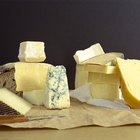
Nutritional Values of Cheese

Calories in One Slice Provolone Cheese

Fat Grams in Cheese
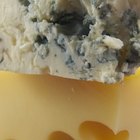
How to Freeze Cheeses
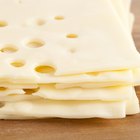
Nutrition in Swiss Vs. American Cheese

Fresh Mozzarella vs. Regular Mozzarella ...

Calories in Pimento Cheese
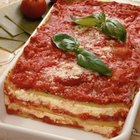
How to Use Ricotta Cheese for Cream ...

How to Make Melted Cheese Using Cubes ...

The Amount of Lactose in Yogurt

How Long Can You Refrigerate Nacho ...

Nutrition Information on Blueberries

Vitamins for Mental Alertness
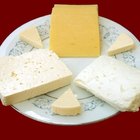
What Makes a Cheese Mild, Medium or ...
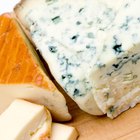
How to Crumble Gorgonzola Cheese

How to Bake Boneless Skinless Tilapia
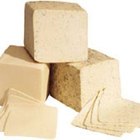
How to Cook With Havarti Cheese
References
Writer Bio
Sara Ipatenco has taught writing, health and nutrition. She started writing in 2007 and has been published in Teaching Tolerance magazine. Ipatenco holds a bachelor's degree and a master's degree in education, both from the University of Denver.
Photo Credits
eugeniek/iStock/Getty Images